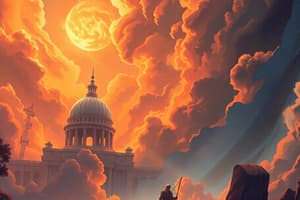Podcast
Questions and Answers
What is the etymological meaning of Political Science?
What is the etymological meaning of Political Science?
- Examination of government systems
- Study of political parties
- Science of the State (correct)
- Analysis of social movements
Which author stated that Political Science begins and ends with the State?
Which author stated that Political Science begins and ends with the State?
- Garner (correct)
- Machiavelli
- John Locke
- Aristotle
How do traditional definitions of Political Science primarily view it?
How do traditional definitions of Political Science primarily view it?
- As the study of international relations
- As the study of State or Government (correct)
- As the study of the economy
- As the analysis of contemporary issues
What aspect do modern definitions of Political Science emphasize?
What aspect do modern definitions of Political Science emphasize?
According to which writer does Political Science consider the State as an institution of power?
According to which writer does Political Science consider the State as an institution of power?
What is the view of Sir John R. Seeley on Political Science?
What is the view of Sir John R. Seeley on Political Science?
Which of the following is a characteristic of traditional definitions of Political Science?
Which of the following is a characteristic of traditional definitions of Political Science?
What do modern definitions of Political Science primarily include?
What do modern definitions of Political Science primarily include?
Flashcards are hidden until you start studying
Study Notes
Etymological Meaning
- "Political Science" derives from the Greek word "Polis," signifying city-state, reflecting the foundational unit of human organization in ancient Greece.
- The adjective "Political" relates to "Politics" and is used to denote matters pertaining to the state, despite modern states being larger territorial entities.
- Political Science is fundamentally defined as the science of the State.
Definitions of Political Science
- Political Science is defined variably by different political schools, categorized into traditional and modern definitions.
Traditional Definitions
- Traditional writers identify Political Science as the study of the State or Government, with several key contributions:
Science or Study of the State
- Garner posits that "Political Science begins and ends with the State."
- Blunschli describes Political Science as the science concerning the State, focusing on understanding its fundamental conditions and various manifestations.
- Gettell views it as a historical exploration of the State's evolution, analytical study of its current state, and an ethical discussion of its ideal nature.
- Garies highlights that Political Science examines the State as a powerful institution, encompassing its relations, origins, ethical significance, economic issues, and conditions of existence.
Science or Study of Government
- Some political thinkers interpret Political Science specifically as the science of government, with Sir John R. Seeley asserting it examines governmental phenomena similarly to how other sciences investigate their respective fields.
Modern Definitions
- Modern perspectives emphasize the foundation, origin, and growth of the State as central to Political Science.
- This view regards Political Science as concerned with state organization, powers, and functions, stressing the significance of institutions and customary practices governing state affairs.
Studying That Suits You
Use AI to generate personalized quizzes and flashcards to suit your learning preferences.




